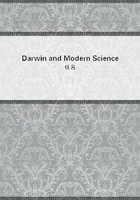
第3章
The Syndics of the University Press have agreed, in the event of this volume being a financial success, to hand over the profits to a University fund for the endowment of biological research.
It is clearly impossible to express adequately in a single volume of Essays the influence of Darwin's contributions to knowledge on the subsequent progress of scientific inquiry. As Huxley said in 1885: "Whatever be the ultimate verdict of posterity upon this or that opinion which Mr Darwin has propounded; whatever adumbrations or anticipations of his doctrines may be found in the writings of his predecessors; the broad fact remains that, since the publication and by reason of the publication of "The Origin of Species" the fundamental conceptions and the aims of the students of living Nature have been completely changed...But the impulse thus given to scientific thought rapidly spread beyond the ordinarily recognised limits of Biology. Psychology, Ethics, Cosmology were stirred to their foundations, and 'The Origin of Species' proved itself to be the fixed point which the general doctrine needed in order to move the world."In the contributions to this Memorial Volume, some of the authors have more especially concerned themselves with the results achieved by Darwin's own work, while others pass in review the progress of research on lines which, though unknown or but little followed in his day, are the direct outcome of his work.
The divergence of views among biologists in regard to the origin of species and as to the most promising directions in which to seek for truth is illustrated by the different opinions of contributors. Whether Darwin's views on the modus operandi of evolutionary forces receive further confirmation in the future, or whether they are materially modified, in no way affects the truth of the statement that, by employing his life "in adding a little to Natural Science," he revolutionised the world of thought. Darwin wrote in 1872 to Alfred Russel Wallace: "How grand is the onward rush of science: it is enough to console us for the many errors which we have committed, and for our efforts being overlaid and forgotten in the mass of new facts and new views which are daily turning up." In the onward rush, it is easy for students convinced of the correctness of their own views and equally convinced of the falsity of those of their fellow-workers to forget the lessons of Darwin's life. In his autobiographical sketch, he tells us, "I have steadily endeavoured to keep my mind free so as to give up any hypothesis, however much beloved...as soon as facts are shown to be opposed to it." Writing to Mr J. Scott, he says, "It is a golden rule, which I try to follow, to put every fact which is opposed to one's preconceived opinion in the strongest light. Absolute accuracy is the hardest merit to attain, and the highest merit. Any deviation is ruin."He acted strictly in accordance with his determination expressed in a letter to Lyell in 1844, "I shall keep out of controversy, and just give my own facts." As was said of another son of Cambridge, Sir George Stokes, "He would no more have thought of disputing about priority, or the authorship of an idea, than of writing a report for a company promoter."Darwin's life affords a striking confirmation of the truth of Hazlitt's aphorism, "Where the pursuit of truth has been the habitual study of any man's life, the love of truth will be his ruling passion." Great as was the intellect of Darwin, his character, as Huxley wrote, was even nobler than his intellect.
A.C. SEWARD.
Botany School, Cambridge, March 20, 1909.